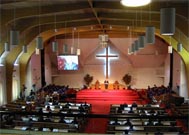Pope to greet diverse but troubled US church
 Washington/Rome - Arriving Tuesday for a six-day visit to Washington and New York, Pope Benedict XVI will find an increasingly diverse body of Catholics that remains troubled by priest abuse scandals and increasing numbers of parishioners leaving the faith.
Washington/Rome - Arriving Tuesday for a six-day visit to Washington and New York, Pope Benedict XVI will find an increasingly diverse body of Catholics that remains troubled by priest abuse scandals and increasing numbers of parishioners leaving the faith.
Ethical and spiritual issues are destined to dominate Benedict's visit to the United States, where Roman Catholics number around 67.5 million - the third-largest concentration in the world after Brazil and Mexico.
"Together with your bishops, I have chosen as the theme of my journey three simple but essential words: 'Christ our hope,'" Benedict said in a video message to US Catholics.
"Following in the footsteps of my venerable predecessors, Paul VI and John Paul II, I shall come to United States of America as pope for the first time, to proclaim this great truth: Jesus Christ is hope for men and women of every language, race, culture and social condition."
That does not mean Benedict will ignore the child sex abuse scandals that have rocked the US church in recent years, amid revelations of child molestation dating back decades and often systematically covered up by church leaders.
A network of abuse victims said that it has had no response from the Vatican on a request to meet with Benedict in the US. Barbara Blaine, president of the Survivors Network of those Abused by Priests (SNAP), said that she suspects he will meet with a small group of carefully chosen victims.
Benedict, who has denounced the "dirt" within the church, is likely to broach the issue when he addresses US bishops Tuesday in Washington, and during two Saturday engagements in New York: a Mass at St Patrick's Cathedral for nuns and priests, and a meeting with students at St Joseph's Seminary, Father Frederico Lombardi said in Rome ahead of the trip.
Most Americans expect the pope to address religion and morality and are "less interested" in his views on the war in Iraq, which the Vatican opposed in 2003, but Benedict will likely discuss Iraq with President George W Bush in a private meeting Wednesday at the White House.
Nearly a quarter of US adults are Catholic, but a major shift is taking place in the church's demographics. The proportion of Catholics has remained steady, even as one-third of those raised Catholic have left the faith, off set by a large influx of immigrants from Latin America, a recent survey by the Pew Forum on Religion and Public Life found.
Observers see the future of the church tied closely with the continued engagement of new immigrant populations, which are leading efforts toward more charismatic Masses.
"So the future of the Catholic Church depends very much on Catholics to retain Latinos for the next 25-30 years," Carl Anderson, leader of the men's lay organization the Knights of Columbus, told reporters ahead of the pope's visit.
"Benedict is very concerned about this. It is clear from his meeting with Latin American bishops in Brazil that he has a broad vision for the western hemisphere. He refers to it as a hemisphere of baptized Christians, where a majority of Catholics today live."
Hispanic Catholics expect the pontiff to address immigration issues during his visit. Benedict acknowledged the growing Latino voice in the US church, speaking briefly in Spanish in his pre-trip video message.
While the US has drawn praise for its religious fervour in comparison to secular Europe, most members of the US church do not march in lockstep with the Vatican on issues such as reproductive ethics and capital punishment. The church is also suffering from a shortage of priests and finds the laity taking on an ever greater role.
Views on abortion among US Catholics reflect the views of the public as a whole, with 51 per cent of Catholics favouring legal abortion in most cases, though those who attend church regularly are more likely to oppose it, and 60 per cent support the death penalty, the Pew survey said. Such issues could arise in a meeting with leaders from Catholic universities, which have drawn criticism within the church for straying from Vatican teaching.
Meetings are planned between the pontiff and leaders of other faiths - Judaism, Buddhism, Hinduism and Jainism - Thursday in Washington and with leaders of several Christian denominations Friday in New York. The talks offer the pope an opportunity to continue sometimes tense dialogues.
Recent controversies include Benedict's baptizing of Italy's most prominent Muslim critic at an Easter vigil, and protests over a revised Catholic prayer for the conversion of Jews.
Human-rights concerns, including religious freedom and Catholic opposition to abortion and capital punishment, promise to feature prominently in what the Vatican has described as the "highlight" of the trip: Benedict's speech Friday to the United Nations General Assembly in New York.
A non-binding moratorium on the death sentence was approved by the General Assembly in December with strong Vatican support over opposition from the United States. Benedict is likely to appeal for more nations to endorse the initiative during 2008, the 60th anniversary of the UN Universal Declaration of Human Rights.
The visit to the world body also comes just five months after the pontiff said that "moral relativism" - an aspect of the modern world he considers evil and under which he has categorized abortion, embryonic stem-cell research and euthanasia - dominates debate at international organizations. (dpa)